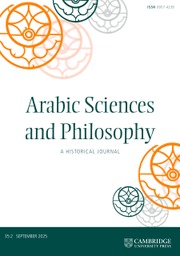Article contents
Equal before the Law: the Evilness of Human and Divine Lies ‘Abd al-Ğabbār's Rational Ethics
Published online by Cambridge University Press: 26 August 2003
Abstract
This paper sets out to chart the fortunes of one of the most significant moral propositions in Mu'tazilite moral theory — namely, that it is evil to lie, and it is evil irrespective of the consequences of so doing. The reasons which promote this principle to significance relate to the broader context of Mu'tazilite theological orientation, which aims to vindicate God's justice through demonstrating that moral value does not derive from revelation. Yet this principle suffers the difficulties which commonly afflict deontological precepts, particularly the challenges posed by their conflict with teleological moral demands in certain situations, as well as the difficulty of empirically ascertaining that a moral principle has in fact given the agent his reason for action, as the Mu'tazilites attempt to do. These were difficulties which Aš'arite critics of Mu'tazilite moral claims were quick to pick up on, and it is in the light of such hostile fire that the coherence of the Mu'tazilite position on the evilness of lies is examined. This is the principal focus of this essay, and it is complemented by an examination of how the principle carries over to the realm of divine morality: can God tell a lie? If not, why not? And what does this reveal about the ordering of moral values in Mu'tazilite thought?
- Type
- Research Article
- Information
- Copyright
- © 2003 Cambridge University Press
- 4
- Cited by


